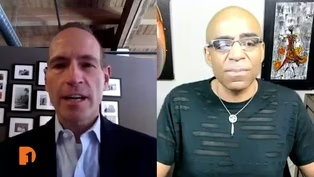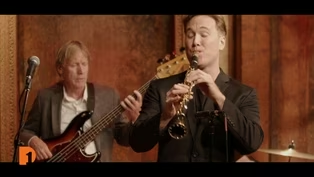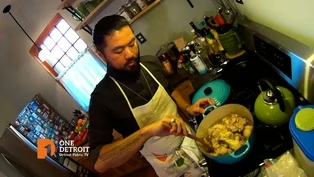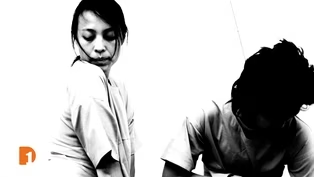
The Lost Constellation Project/Dave Bennett Quartet
Season 4 Episode 39 | 26m 46sVideo has Closed Captions
The Lost Constellation Project/Dave Bennett Quartet | Episode 439
The Lost Constellation Project/Dave Bennett Quartet Episode 439
Problems playing video? | Closed Captioning Feedback
Problems playing video? | Closed Captioning Feedback
One Detroit is a local public television program presented by Detroit PBS

The Lost Constellation Project/Dave Bennett Quartet
Season 4 Episode 39 | 26m 46sVideo has Closed Captions
The Lost Constellation Project/Dave Bennett Quartet Episode 439
Problems playing video? | Closed Captioning Feedback
How to Watch One Detroit
One Detroit is available to stream on pbs.org and the free PBS App, available on iPhone, Apple TV, Android TV, Android smartphones, Amazon Fire TV, Amazon Fire Tablet, Roku, Samsung Smart TV, and Vizio.
Providing Support for PBS.org
Learn Moreabout PBS online sponsorship- Hi, I'm Christine McDonald and here's what's coming up this week on One Detroit Arts and Culture, marking Asian American and Pacific Islander heritage month with a unique performance that includes dance and poetry streaming at the DIA.
Then you're invited to a Filipino supper club to combine new friends and recipes passed down generations.
And arts engines Aaron Dworkin with Charles Grode on the power of arts collaboration.
It's all ahead this week on One Detroit Arts and Culture.
- [Announcer] From Delta faucets to Behr paint, Masco corporation is proud to deliver products that enhance the way consumers all over the world experience and enjoy their living spaces.
Masco serving Michigan communities since 1929.
- [Announcer] Support for this program provided by the Cynthia and Edsel Ford Fund for Journalism at Detroit Public TV, the Kresge Foundation, Community Foundation for Southeast Michigan.
- [Announcer] The DTE foundation is a proud sponsor of Detroit public TV among the state's largest foundations, committed to Michigan focused giving.
We support organizations that are doing exceptional work in our state visit DTEFoundation.com to learn more.
- [Announcer] Business Leaders for Michigan, dedicated to making Michigan a top 10 state for jobs, personal income, and a healthy economy.
Also brought to you by, The Fred A. and Barbara M Erb Family Foundation and viewers like you.
(upbeat music) - Hi there and welcome to One Detroit, I'm Christy McDonald.
Thanks so much for joining me.
This show is all about arts and culture and our connection to performances, events, and groups.
As things begin to open up just a bit more around Michigan.
Coming up this week, we mark Asian-American and Pacific Islander Heritage Month by learning more about virtual dance and poetry performances you can find at the DIA.
Plus we get an invite to a Filipino supper club here in Detroit.
It's sharing culture and recipes passed down through generations.
And then Spanx founder, Aaron Dworkin and his Arts Engine series, this week he talks with Charles Grode, the president of merit school of music in Chicago about the importance of arts organizations, sharing ideas.
It's all just ahead.
And we're starting off with dance and poetry that celebrates AAPI heritage month.
It's called the "Lost Constellation' Project and it's available on the Detroit Institute of Arts website.
One Detroit's Will Glover talks with writer and performer Frances Kai Wah Wang.
(soft music) - [Frances] Sometimes I feel lost, lost among the stars.
You can trace the constellation of my body, the constellation...
So "Lost Constellations" of project by Is/land, I-S/L-A-N-D, It's a Asian American contemporary performance art collaborative.
And so we have our collective of artists, we have musicians and dancers and poets, that's me, and other other artists.
And we try to create beautiful and meaningful art.
With the rise in anti American violence across the country you know, with the shootings in Atlanta and Indianapolis, the way that Asian American women are overly targeted or disproportionately targeted for these anti-Asian American hate crimes as well as elders and Asian women, elders even worse.
And so we wanted to do something that could capture the beauty of Asian American women and elders.
And also say something, say something.
- Why choose constellations as the theme?
What in particular about that is impactful?
- What I did with the poem, right?
I started with the idea of a lost constellation and the stars and being lost, you're you're like, you're right there.
That's the thing with constellations, right?
The stars are there, whether you see them or not, they're there.
And so that's not the issue, right?
The stars are there and so a lot of times Asian-Americans are not seen, right?
In the popular media, as well as in society, I mean, but we're right there and we've always been there, right?
Asian Americans have been in this country since the 1500s.
- One of the lines in the poem is, "coming from one tradition and growing up in another and choosing to take the best of both to create something new" - Coming from one tradition, growing up in another and choosing to take the best of both to create something new.
- Can you elaborate on that in the context of exploring interdependence, healing, and connecting and the elders and how all that culminate?
- A lot of times when people immigrate, right?
for them, their culture stays frozen in time as of the year that they immigrated.
'Cause they remember back very fondly usually of their country, but at the same time, they're courageous to take this mad adventure, to go to another country, new language, new culture, right?
I mean think how many of us, like we grew up here in America, how many of us would go somewhere?
Like not speaking language, to like $150 in our pocket, it's hard to do, but then at the same time, so they've made this leap and they bring all these memories and these cultures and these things that they understand, a lot of times in America, there's a lot of things in America that don't make sense to an immigrant.
I grew up here, so I'm second generation and there's still a lot of things in the mainstream culture that don't make sense to me.
At the same, parents are raising children in this way, the children are being socialized, not just by their parents and their parents' original culture but also by the mainstream culture, the kids on the playground and all that stuff.
And so you're caught between two different cultures and you need to find your way through that in a meaningful way.
But some parents really want their children, their daughters, especially to be nice and quiet, right?
'Cause that's a cultural, actually that's that goes across cultures, right?
A lot of people like their daughters to be nice and quiet.
And then at the same time, once they grow up, they want them to be outspoken.
And to be able to go get, you know, to be a go getter and get that big marketing job to get that big corporate job or be a lawyer, but how can you do that if you've been socialized your whole life to be nice and quiet?
- We are a zigzag path of lights.
As we forge new identities and create real lives in this place.
- Part of this makes message that you're trying to, how do you fit between cultures?
And so a lot of people have to, it's like code switching, but culture switch.
So you switch your one way in one culture and you're another way in another culture.
How do you build an authentic life for yourself between these two cultures?
- We are in API month, there has been a lot this month, but overall, do you feel that there is ample representation of the API community in the arts?
- No, absolutely not.
There's a huge under-representation of Asian-American artists and there needs to be more outreach, there needs to be more financial support because this is an important part of our American history and our American culture and our American experience.
But sometimes museums and curators and arts organizations, they don't necessarily understand that they put the Asian-Americans in a box.
You know, some people, not all of course but some people don't understand the difference between Asian and Asian-American, right?
That's the first divide and that's huge, right?
And then access economic aspect of it.
That if you come from immigrants and refugees, you have a much smaller safety net.
And how do you go and be an artist without that big safety net, without the intergenerational wealth?
without a lot of support?
It's really a big risk to take.
- To build the bridge of magpies, to bring together the beloved community, where everyone is welcome, seen fed, housed, reunited.
- Could you tell us where people can go to experience "Lost Constellation" and how they can interact with and enjoy the project?
- If you want to find out more about Is/land, Asian-American contemporary performance collaborative, go to our website is is-land.org And if you would like to see "Lost Constellation," go to YouTube and look up the DIA Detroit Institute of Arts and "Lost Constellation" and you should be able to find it.
- Musician and founder of this Sphinx organization, Aaron Dworkin has an interview series here on Detroit Public Television called Arts Engines.
Well, this week he catches up with Charles Grode.
He's the president and executive director of the Merit School of Music in Chicago.
And they talk about the impact of collaboration between different arts organizations.
- I'm so excited because I have been honored to be able to know about Merit for many years and its extraordinary impact not only in Chicago, but really on our field as a whole.
But could you just kind of give us that quick just kind of overarching sense for any of our audience who might not be familiar with Merit, the scope and focus for Merit?
- Sure, happy always to talk about Merit.
Merit has been around since 1979.
We were started at a time when the Chicago Public School System really pulled back their investment in arts education.
And we were founded by two visionary leaders, two visionary women who said, you know, talent is equally distributed, but opportunity is not.
And so Merit was founded with that in mind, we have grown significantly over the last 40 years, we have approximately 3000 students and we work with them across the city and centrally in our West loop location.
It's everything, early childhood up through high school and we are jazz and classically focused.
And we really believe that music offers lifelong transformation opportunities and that's what we're pleased and what I'm pleased and honored to be doing every day.
- As you look at the field today, where do you see kind of the either the biggest challenges and or the biggest opportunities that just exist in music education?
Are there any key things that you think you know now, right now, here's what we're experiencing.
This is the biggest challenge that we see for young people, either accessing music education or engaging in it, or here is the biggest, we think, opportunity that may be underutilized at this point.
- Sure.
Well, I think there are two components to that answer, right?
One is related to the pandemic and one is related to, I think, an overdue reckoning with long standing systemic racism, right?
And just inequity in the arts.
And so at Merit we're really I think digging deeply into both of those, so part of that is about the opportunity and the access provided by virtual instruction.
So, prior to last winter, prior to mid-March, there was no virtual instruction happening at Merit School of Music.
We pivoted within two weeks in the interest of keeping our musical community whole and vibrant.
Also as, you know, a few months after that, with the murder of George Floyd, a real need to continue to dig deeply into what I think has long been a fight for equity at Merit.
And I think the intersection of those two challenges is really extraordinary work to do, it's the work that will, I think, shape the future and the next generation of musicians and arts leaders.
And I think it also presents us with tremendous opportunity because there's such, destabilization, there's such isolation due to the pandemic.
I think people are so eager to connect and to make things better together through the arts.
So I think that's where we're doing the work and I think the last thing I would say is, the best news I think is that it's not work that we are doing alone, you started your question by asking about the field, and if I think about the time that I've been active and that we've had the opportunity to work together, I think the conversations rather than having multiple disparate conversations, the conversations are becoming one, right?
And I think Sphinx Connect has been just extraordinary at bringing individuals from the League of American Orchestras, from the National Guild for Community Arts Education, bringing those groups together, right?
And instead of having two separate conversations at two different conferences or three different conferences, we're really having that conversation thanks to Sphinx Connect.
And that's leading to some really, I think, really powerful collective impact work in lots of cities across the country.
- Any sense or any kind of key aspects or ways that you view music schools being able to collaborate with orchestras or with a presenter?
In other words outside, if you will, of the direct field any examples of that, that you think are really important?
- Sure.
Well, I think that part of what I've also seen is a much greater awareness within individuals, right?
And within organizations that the work to do is what's important, right?
The transformation that we seek for the young people, that we exist to engage and to help really see them achieve success, I think that is work that has grounded people that I've worked closely with here in Chicago over many years to say, What we need to do together is it's too big for any one of us to do, it's bigger than my ego or my fundraising goal.
And so what I've seen as a real spirit of generosity, I've had the pleasure of planning for and then co-leading the Chicago Musical Pathways Initiative which is, it's been tremendous over the last year and a half, we're in our second year.
It's really about identifying young musicians from traditionally underrepresented communities that want to be professional musicians, helping them to achieve success in getting into top colleges and conservatories.
And that's work that Merit is leading, It's funded with a generous grant by the Andrew W. Mellon Foundation, and we do that work with Chicago Youth Symphony Orchestras and with Chicago Sinfonietta and so many others, it's a nine organization collaborative.
And you mentioned orchestras, I talked about the Sinfonietta, the Chicago Symphony Orchestra and their New Connie Music Institute are at that table along with many smaller organizations too.
So I'm talking about the structure but what, I'm really, I think the content of that work is that we all have a part to play and we can build that work with the pathway, that developmental pathway in mind, and what Merit can bring to it is hosting of the staff force CNPI, right?
But then those orchestras have tremendous resources in their roster, right?
They're musicians, extraordinary performances, extraordinary teachers and those are the things that we have to look at, what are our unique talents?
How do we bring them around the table and together on behalf of young people?
- As we move into the summer and more and more people are getting vaccinated more people are gathering again for meals and food really brings us together.
And it's also a great way to share different cultures and celebrate them.
We heard about Shane Bernardo a few years ago who started the Detroit Filipino supper Club as a way to stay connected to his roots.
And he invited us to dinner pre COVID to see how he gathered with new friends over old recipes handed down generations.
- For sure, yeah.
(indistinct chatters) - Today I'm cooking the meal in preparation for our supper club.
It's called the Detroit Filipino Supper Club.
And it's a way for those of us in the diaspora to help celebrate our culture and come together around food.
These are spaces that are important for me to build socially, but also culturally and politically, because food is a really great way for bringing people together.
So the way it started is a mutual friend introduced me and Ali together.
And we were just reminiscing about all the different foods that we used to enjoy when we were growing up and how much we miss that.
And we missed the camaraderie and the social aspects of coming around food, especially around the holidays.
The Philippine Archipelago is made up of over 7,100 different islands.
And Luzon is the North where my people are from, the Visayas is the central region.
And Amanda now is the Southern region.
To look at our foods is just one of the many ways to show that how nuanced and how varied our culture really is.
My grandmother transitioned to ancestor hood in 2016, so fairly recently, that hit me pretty hard because when my parents were working, my grandmother was one of my main caregivers, but then growing up as an adult and having to deal with grief of losing my father and my grandmother, I can now pair the grief that I was feeling from that sense of loss, with some of the what I refer to as ancestral wisdom and ancestral creativity within the food that I'm making.
It's healing, to be able to reconnect with our land, kind of an indirect way by preparing and celebrating some of these foods and dishes.
If I were to ask you what your favorite food was, I'm sure you could name a whole list of things.
If I were to ask you, is there a particular dish or food that you look for in and around your family gathering?
You could probably come up with another list.
And then if I were to ask you, how would you feel if you could never enjoy those dishes or foods ever again?
You could probably come up with another list of emotions.
- When are you going?
- Same time.
- Okay.
- Because then we can travel together.
- A reason why I'm really happy to do this piece is because it gives folks an alternative, we're seeing our community, A lot of times, Filipino Americans are homogenized and our identities are really flattened.
- And we thank everybody for being here as well and for creating a community for us.
- So the work that I do within myself and within the Filipino American Community here in Detroit is indicative of the kind of work that needs to happen for anyone that's been displaced off their ancestral land and has found it particularly harder and more difficult to celebrate their own traditions.
- Our thanks to Shane and as part of AAPI Heritage Month, Detroit public television, along with APIA Vote Michigan will be holding a virtual live town hall, exploring the history of anti-Asian racism and how it continues to affect the lives of Asian Americans in Metro Detroit.
It's Wednesday, May 19th at 7:00 PM.
You can live stream it on Facebook and on YouTube.
Just head to oneetroitpbs.org to register and join us.
That is going to do it for One Detroit Arts and Culture this week.
Make sure you come back and see me for One Detroit on Thursday night at 7:30.
Take and be well.
(Jazz music playing) - [Announcer] You can find more at onedetroitpbs.org or subscribe to our social media channels and sign up for our One Detroit newsletter.
- [Announcer] From Delta faucets to Behr paint, Masco Corporation is proud to deliver products that enhance the way consumers all over the world experience and enjoy their living spaces.
Masco, serving Michigan communities since 1929.
- [Announcer] Support for this program provided by, the Cynthia and Edsel Ford Fund for Journalism at Detroit Public TV, the Kresge Foundation, Community Foundation for Southeast Michigan.
- [Announcer] The DTE Foundation is a proud sponsor of Detroit public TV among the state's largest foundations committed to Michigan focused giving.
We support organizations that are doing exceptional work in our state visit DTEfoundation.com to learn more.
- [Announcer] Business Leaders for Michigan, dedicated to making Michigan a top 10 state for jobs, personal income, and to help you economy, also brought to you by, the Fred A. and Barbara M. Erb Family Foundation.
And viewers like you.
(upbeat music)
Video has Closed Captions
Clip: S4 Ep39 | 6m 46s | Arts Engines: Charles Grode (6m 46s)
Video has Closed Captions
Clip: S4 Ep39 | 4m 38s | The Dave Bennett Quartet | Episode 439/Segment 4 (4m 38s)
The Detroit Filipino Supper Club
Video has Closed Captions
Clip: S4 Ep39 | 3m 20s | The Detroit Filipino Supper Club | Episode 439/Segment 3 (3m 20s)
The Lost Constellation Project
Video has Closed Captions
Clip: S4 Ep39 | 6m 51s | The Lost Constellation Project | Episode 439/Segment 1 (6m 51s)
Providing Support for PBS.org
Learn Moreabout PBS online sponsorship
- News and Public Affairs

Top journalists deliver compelling original analysis of the hour's headlines.

- News and Public Affairs

FRONTLINE is investigative journalism that questions, explains and changes our world.












Support for PBS provided by:
One Detroit is a local public television program presented by Detroit PBS



